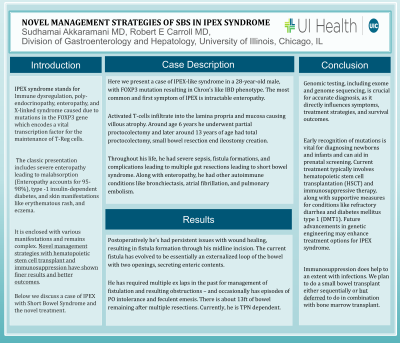Monday Poster Session
Category: Small Intestine
P3250 - IPEX Syndrome With SBS and Its Novel Management Strategies
Monday, October 28, 2024
10:30 AM - 4:00 PM ET
Location: Exhibit Hall E

Has Audio
- SA
Sudhamai Akkaramani, MD
University of Illinois
Chicago, IL
Presenting Author(s)
Sudhamai Akkaramani, MD
University of Illinois, Chicago, IL
Introduction: IPEX syndrome stands for Immune dysregulation, polyendocrinopathy, enteropathy, X-linked syndrome caused due to mutations in forkhead box P3 FOXP3 gene which encodes a vital transcription factor for the maintenance of T -Reg cells. Activated T-cells infiltrate into the lamina propria and mucosa causing villous atrophy. Classic presentation includes severe intractable enteropathy leading to malabsorption (Enteropathy accounts for 95-98%), endocrinopathy (type -1 insulin dependent diabetes) and dermatitis (erythematous rash, eczema). There are other symptoms like recurrent infections leading to sepsis, hematologic and renal abnormalities etc. Below we discuss a case of IPEX with SBS and the novel treatment.
Case Description/Methods: Here we present a case of milder variation of IPEX syndrome in a 28-year-old male, with FOXP3 mutation resulting in Crohn’s like IBD phenotype. Around age 6 years he underwent partial proctocolectomy and later around 13 years of age had total proctocolectomy, small bowel resection and ileostomy creation. Throughout his life he had severe sepsis, fistula formations and complications leading to multiple gut resections leading to short bowel syndrome. Along with enteropathy he had other autoimmune conditions like bronchiectasis, atrial fibrillation and pulmonary embolism. All were managed accordingly.
Post operatively he's had persistent issues with wound healing, resulting in fistula formation through his midline incision. The current fistula has evolved to be essentially an externalized loop of bowel with two openings, secreting enteric contents. He has required multiple exploratory laparotomies in the past for management of fistulation and resulting obstructions. There is about 13ft of bowel remaining after multiple resections. He is currently dependent on Total Parenteral Nutrition.
Discussion: Novel management strategies with hematopoietic stem cell transplant and immunosuppression have shown finer results and better outcomes. Immunosuppression does help to an extent with infections and so do steroids. We plan to do a small bowel transplant either sequentially or in combination with bone marrow transplant. As a milder variant of this mutation, we anticipate this plan of treatment will have a favorable aftereffect.
Disclosures:
Sudhamai Akkaramani, MD. P3250 - IPEX Syndrome With SBS and Its Novel Management Strategies, ACG 2024 Annual Scientific Meeting Abstracts. Philadelphia, PA: American College of Gastroenterology.
University of Illinois, Chicago, IL
Introduction: IPEX syndrome stands for Immune dysregulation, polyendocrinopathy, enteropathy, X-linked syndrome caused due to mutations in forkhead box P3 FOXP3 gene which encodes a vital transcription factor for the maintenance of T -Reg cells. Activated T-cells infiltrate into the lamina propria and mucosa causing villous atrophy. Classic presentation includes severe intractable enteropathy leading to malabsorption (Enteropathy accounts for 95-98%), endocrinopathy (type -1 insulin dependent diabetes) and dermatitis (erythematous rash, eczema). There are other symptoms like recurrent infections leading to sepsis, hematologic and renal abnormalities etc. Below we discuss a case of IPEX with SBS and the novel treatment.
Case Description/Methods: Here we present a case of milder variation of IPEX syndrome in a 28-year-old male, with FOXP3 mutation resulting in Crohn’s like IBD phenotype. Around age 6 years he underwent partial proctocolectomy and later around 13 years of age had total proctocolectomy, small bowel resection and ileostomy creation. Throughout his life he had severe sepsis, fistula formations and complications leading to multiple gut resections leading to short bowel syndrome. Along with enteropathy he had other autoimmune conditions like bronchiectasis, atrial fibrillation and pulmonary embolism. All were managed accordingly.
Post operatively he's had persistent issues with wound healing, resulting in fistula formation through his midline incision. The current fistula has evolved to be essentially an externalized loop of bowel with two openings, secreting enteric contents. He has required multiple exploratory laparotomies in the past for management of fistulation and resulting obstructions. There is about 13ft of bowel remaining after multiple resections. He is currently dependent on Total Parenteral Nutrition.
Discussion: Novel management strategies with hematopoietic stem cell transplant and immunosuppression have shown finer results and better outcomes. Immunosuppression does help to an extent with infections and so do steroids. We plan to do a small bowel transplant either sequentially or in combination with bone marrow transplant. As a milder variant of this mutation, we anticipate this plan of treatment will have a favorable aftereffect.
Disclosures:
Sudhamai Akkaramani indicated no relevant financial relationships.
Sudhamai Akkaramani, MD. P3250 - IPEX Syndrome With SBS and Its Novel Management Strategies, ACG 2024 Annual Scientific Meeting Abstracts. Philadelphia, PA: American College of Gastroenterology.
